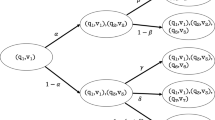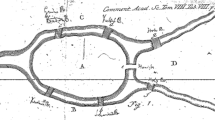Summary
Inestimable confusion has resulted from the common practice of discussing the role of theory in science without specifying the kind of theory referred to: i.e., conjectures based on abstraction from past sensory observations, which are the backbone of science, or Type 2 conjectures, which postulate imagined properties. The latter can never receive empirical support (by “indirect confirmation” or otherwise); they impede the progress of science; they contribute nothing to scientific knowledge; and they cause much waste of time, money, and journal space in futile debates. Hypothetical constructs—giving out “a dream of our own imagination for a pattern of the world”—serve no useful purpose in science.
Similar content being viewed by others
References
ADAMS, D. K. Note on method. Psychol. Rev. 1937, 44, 212–218.
ANASTASI, ANNE. The concept of validity in the interpretation of test scores. Educ. psychol. Measmt, 1950, 10, 67–78.
APA Committee on Psychological Tests. Technical recommendations for psychological tests and diagnostic techniques. Psychol. Bull. Suppl. 1954, 51, 2, Part 2, 1–38.
BACON, F. The great instauration: the plan of the work. 1620. Reprinted in Selected writings of Francis Bacon; with an introduction and notes by Hugh G. Dick. New York: Modern Library, 1955. Pp. 439–451. (a)
BACON, F. The new organon. 1620. Reprinted as cited above. Pp. 453–540. (b)
BECHTOLDT, H. B. Construct validity: a critique. Amer. Psychologist, 1960, 15, 619–629.
BERGMANN, G. Philosophy of science. Madison: Univer. Wisconsin Press, 1957.
BERGMANN, G., and SPENCE, K. W. Operationism and theory in psychology. Psychol. Rev., 1941, 48, 1–14.
BEVERIDGE, W. I. B. The art of scientific investigation. (Rev. ed.) New York: Norton, 1957.
BLAKE, R. M., DUCASSE, C. J. and MADDEN, E. H. Theories of scientific method: the Renaissance through the nineteenth century. Seattle: Univer. Washington Press, 1960.
BOLLES, R. C. Occam’s razor and the science of behavior. Psychol. Rep., 1957, 3, 321–324.
BORING, E. G. The role of theory in experimental psychology. Amer. J. Psychol., 1953, 66, 169–184.
BRAITHWAITE, R. B. Scientific explanation: a study of the function of theory, probability, and law in science. Cambridge: Cambridge Univer. Press, 1953.
BRIDGMAN, P. W. The logic of modem physics. New York: Macmillan, 1927.
BROWN, G. B. Science: its method and its philosophy. London: Allen & Unwin, 1950.
CAJORI, F. Newtons Principia: Motte’s translation revised. Berkeley: Univer. California Press, 1934.
CAMPBELL, D. T., & FISKE, D. W. Convergent and discriminant validation by the multitrait-multimethod matrix. Psychol. Bull., 1959, 56, 81–105.
CONANT, J. B. Science and common sense. New Haven: Yale Univer. Press, 1951.
CRONBACH, L. J., & MEEHL, P. E. Construct validity in psychological tests. Psychol. Bull., 1955, 52, 281–302.
DALLENBACH, K. M. The place of theory in science. Psychol. Rev., 1953, 60, 33–39.
DAVIS, R. C. Physical psychology. Psychol. Rev., 1953, 60, 7–14.
DINGLE, H. Science and human experience. London: Williams & Norgate, 1931.
DUHEM, P. La théorie physique: son objet et sa structure. Paris: Marcel Rivière, 1914.
ENGLISH, H. B., & ENGLISH, A. C. A comprehensive dictionary of psychological and psychoanalytical terms: a guide to usage. New York: Longmans, Green, 1958.
FARRELL, B. A. On the limits of experimental psychology. Brit. J. psychol., 1955, 46, 165–177.
FEIGL, H. Philosophical embarrassments of psychology. Amer. Psychologist, 1959, 14, 115–128.
GAMOW, G. Matter, earth, and sky. Englewood Cliffs, N. J.: Prentice-Hall, 1958.
GELDARD, F. A. ‘Explanatory principles’ in psychology. Psychol. Rev., 1939, 46, 411–424.
GUTHRIE, E. R. On the nature of psychological explanations. Psychol. Rev., 1933, 40, 124–137.
HARLOW, H. F. Motivation as a factor in the acquisition of new responses. In M. R. Jones (Ed.), Current theory and research in motivation: a symposium. Vol. 1. Lincoln: Univer. Nebraska Press, 1953. Pp. 24–49.
HEMPEL, C. G. Fundamentals of concept formation in empirical science. Chicago: Univer. Chicago Press, 1952.
HERSCHEL, J. F. W. Preliminary discourse on the study of natural philosophy. (Cabinet cyclopaedia ed.) London: Longman, Brown, Green and Longmans, 1842.
HULL, C. L. The conflicting psychologies of learning—a way out. Psychol. Rev., 1935, 42, 491–516.
HULL, C. L. Mind, mechanism, and adaptive behavior. Psychol. Rev., 1937, 44, 1–32.
JENKINS, J. J., & LYKKEN, D. T. Individual differences. Ann. Rev. psychol., 1957, 8, 79–112.
JEVONS, W. S. The principles of science: a treatise on logic and scientific method. New York: Macmillan, 1874.
JOHNSON, H. M. On verifying hypotheses by verifying their implicates. Amer. J. psychol., 1954, 67, 723–727.
KENDLER, H. H. “What is learned?”—a theoretical blind alley. Psychol Rev. 1952, 59, 269–277.
KESSEN, W., & KIMBLE, G. A. “Dynamic systems” and theory construction. Psychol Rev., 1952, 59, 263–267.
KNEALE, W. Probability and induction. 1949. Pages 92–110 reprinted in H. Feigl & May Brodbeck (Eds.), Readings in the philosophy of science. New York: Appleton-Century-Crofts, 1953. Pp. 353–367.
KOCH, S. Behavior as “intrinsically” regulated; work notes toward a pre-theory of phenomena called “motivational.” In M. R. Jones (Ed.), Current theory and research in motivation: a symposium. Vol. 4. Lincoln: Univer. Nebraska Press, 1956. Pp. 42–87.
KRECH, D. Dynamic systems, psychological fields, and hypothetical constructs. Psychol. Rev., 1950, 57, 283–290.
LEWIN, K. Behavior and development as a function of the total situation. In L. Carmichael, Manual of child psychology. (2nd ed.) New York: Wiley, 1954. Pp. 918–970.
LOEVINGER, JANE. Objective tests as instruments of psychological theory. Psychol. Rep., 1957, 3, 635–694. (Monogr. Suppl. No. 9).
MacCORQUODALE, K., & MEEHL, P. E. On a distinction between hypothetical constructs and intervening variables. Psychol. Rev., 1948, 55, 95–107.
McGUIGAN, F. J. Confirmation of theories in psychology. Psychol. Rev., 1956, 63, 98–104.
MARX, M. H. Intervening variable or hypothetical construct? psychol, Rev., 1951, 58, 235–247.
MAZE, J. R. Do intervening variables intervene? Psychol. Rev., 1954, 61, 226–234.
MEEHL, P. E. Clinical versus statistical prediction. Minneapolis: Univer. Minnesota Press, 1954.
MILL, J. S. System of logic. (8th ed.) New York: Harper, 1874.
MILLER, J. G. Symbolic technique in psychological theory. Psychol. Rev., 1939, 46, 464–479.
O’NEIL, W. M. Hypothetical terms and relations in psychological theorizing. Brit. J. psychol., 1953, 44, 211–220.
PIERCE, C. S. Illustrations of the logic of science. Sixth paper. Deduction, induction, and hypothesis. Popular Sci. Mon., 1878, 13, 470–482.
POLYA, G. Mathematics and plausible reasoning. 2 vols. Princeton: Princeton Univer. Press, 1954.
PRATT, C. C. Operationism in psychology. Psychol. Rev., 1945, 52, 262–269.
RANKINE, W. V. M. Outlines of the science energetics. Proc. Philosophical Soc. Glasgow, 1855, vol. 3. Reprinted in W. V. M. Rankine, Miscellaneous scientific papers. London: Griffin, 1881. Pp. 209–228.
REICHENBACH, H. The theory of probability: an inquiry into the logical and mathematical foundations of the calculus of probability. (2nd ed.) Trans. by E. Hutten & Maria Reichenbach. Berkeley: Univer. California Press, 1949.
RITCHIE, B. F. A logical and experimental analysis of the laws of motivation. In M. R. Jones (Ed.), Current theory and research in motivation: a symposium. Vol. 2. Lincoln: Univer. Nebraska Press, 1954. Pp. 121–176.
ROZEBOOM, W. W. Mediational variables in scientific theory. Psychol. Rev., 1956, 63, 249–264.
RUSSELL, B. Mysticism and logic and other essays. New York: Longmans, Green, 1918.
RUSSELL, B. Analysis of matter. New York: Harcourt, Brace, 1927.
RUSSELL, B. An inquiry into meaning and truth. New York: Norton, 1940.
SARBIN, T. R. The logic of prediction in psychology. Psychol. Rev., 1944, 51, 210–228.
SARBIN, T. R. Role theory. In G. Lindzey (Ed.), Handbook of social psychology. Vol. 1. Theory and method. Reading, Mass.: Addison-Wesley, 1954. Pp. 223–258.
SCHLICK, M. Philosophy of nature. Trans, by A. von Zeppelin. New York: Philosophical Library, 1949.
SIDMAN, M. Tactics of scientific research: evaluating experimental data in psychology. New York: Basic Books, 1960.
SKINNER, B. F. Are theories of learning necessary? Psychol. Rev., 1950, 57, 193–216.
SKINNER, B. F. Science and human behavior. New York: Macmillan, 1953.
SKINNER, B. F. Verbal behavior. New York: Appleton-Century-Crofts, 1957.
STEVENS, S. S. Psychology and the science of science. Psychol. Bull., 1939, 36, 221–263.
TOLMAN, E. C. Purposive behavior in animals and men. New York: Century, 1932.
TORGERSON, W. S. Theory and methods of scaling. New York: Wiley, 1958.
TURNER, W. S. Can psychology be made wholly objective? Amer. Psychologist, 1961, 16, 142.
UNDERWOOD, B. J. Psychological research. New York: Appleton-Century-Crofts, 1957.
WHEWELL, W. Novum Organum renovatum. London: John W. Parker & son 1858.
WHITTAKER, E. Eddington’s principle in the philosophy of science. Amer. Scientist, 1952, 40, 45–60.
WOODGER, J. H. Physics, psychology and medicine. A methodological essay. Cambridge: Cambridge Univer. Press, 1956.
WOODWORTH, R. S. Dynamics of behavior. New York: Holt, 1958.
ZUBIN, J. On the powers of models. J. Pers., 1952, 20, 430–439.
Author information
Authors and Affiliations
Additional information
The author wishes to thank Drs. T. R. Sarbin, B. J. Underwood, C. C. Pratt, and K. M. Dallenbach for their help and encouragement while he was writing this paper. He is also indebted, for suggestions and criticisms of early drafts to many others — especially to Drs. H. P. Bechtoldt, J. S. Block, R. C. Bolles, D. T. Campbell, L. J. Cronbach, R. C. Davis, G. M. French, E. J. McGuigan, J. P. McKee, and P. E. Meehl.
Rights and permissions
About this article
Cite this article
Turner, W.S. A reexamination of the two kinds of scientific conjecture. Psychol Rec 11, 279–298 (1961). https://doi.org/10.1007/BF03393412
Published:
Issue Date:
DOI: https://doi.org/10.1007/BF03393412




